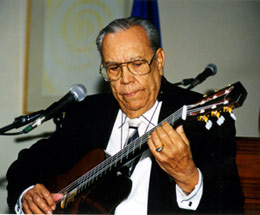 |
 |
 |
 Entertainment | March 2005 Entertainment | March 2005  
'Father of Chicano Music' Dead
 CNN.com CNN.com


| Lalo Guerrero also wrote ballads in the Mexican "corrido" style that honored Robert Kennedy and farmworkers' rights leader Cesar Chavez.

|
Los Angeles - Eduardo "Lalo" Guerrero Jr., who for 60 years created songs in Spanish and English chronicling the Mexican-American experience, including Pachuco music later used in the play "Zoot Suit," has died. He was 88.

The man President Clinton called the father of Chicano music died Wednesday at an assisted living facility in Rancho Mirage, said his son, Mark Guerrero.

Lalo Guerrero was named a national folk treasure by the Smithsonian Institution in 1980 and received the presidential Medal of the Arts from Clinton in 1997.

Guerrero was born in an adobe house in the poor Barrio Viejo neighborhood of Tucson, Ariz., on Christmas Eve 1916. He was never sure how many children his mother had, but he estimated the figure at 16 to 24, including many who died before he was born.

He had no formal musical education but his mother taught him guitar, and during periodic trips to Mexico, relatives inspired him to write songs.

After dropping out of high school during the Depression, Guerrero drifted to Los Angeles, where arranger-producer Manuel Acuna saw him on a street, asked if he was a musician and had him in a recording studio the next day.

"It wasn't planned. I didn't have an agent," he told The Associated Press last year. "It just never occurred to me."

Guerrero went on to create more than 700 songs and sold millions of records in both Spanish and English in a bewildering number of styles, from swing to protest songs, cha-chas to rock 'n' roll. His Spanish hits included "Nunca Jamas" and "Cancion Mexicana," which has been described as Mexico's unofficial national anthem.

He also wrote ballads in the Mexican "corrido" style that honored Robert Kennedy and farmworkers' rights leader Cesar Chavez.

He already was a star in Mexico and the Southwest for his traditional songs when he crossed into the mainstream charts in 1955 with a parody of "The Ballad of Davy Crockett" from a Walt Disney movie. He replaced the pioneer frontiersman with a Mexican called Pancho Sanchez. It sold 500,000 copies.

There followed a string of hit parodies in both English and Spanish with names such as "Pancho Claus," "Elvis Perez" and "Tacos for Two" (to the tune of "Cocktails for Two").

Some took satirical swipes at discrimination, such as "Mama, Don't Let Your Babies Grow Up to Be Busboys."

Guerrero also did a series of children albums featuring Las Ardillitas, a trio of squeaky-voiced talking squirrels that became wildly popular in Mexico and the Spanish-language community. He created them the same year that a song featuring Alvin and the Chipmunks came out in the United States. Alvin's creator sued but a judge threw out the suit after Guerrero said he thought up his characters first.

Some of Guerrero's boogie woogie-influenced Pachuco songs were used in Luis Valdez's "Zoot Suit," about a notorious 1942 riot in which servicemen attacked Mexican-American youths wearing the distinctive baggy clothing.

The popularity of the play, which reached Broadway, and the 1981 movie reignited Guerrero's career and led to an international tour.

Guerrero's last work was to record three of his songs for an album by guitarist Ry Cooder called "Chavez Ravine," which is scheduled to be released this summer.

"You won't see anybody like that ever again," Cooder told the Tucson Citizen. "There was so much variety to his work - the boleros, the Pachuco songs, the rancheras and corridos - but at the same time he was an American original working in a slightly different way from the traditional Mexican way, creating a hybrid style from his own experience of the world."

Guerrero lived in the East Los Angeles area for many years and had a popular nightclub there. He later moved to Cathedral City, near Palm Springs. Even into his 80s, he continued to perform hundreds of free concerts at schools and senior citizen centers.

"I like to do it," he once told The Desert Sun of Palm Springs. "I like to make the old folks happy (and) I like to play for the kids in schools. I talk to them and say, 'I came from humble beginnings, too, and I won the presidential medal."'

Guerrero's honors also include a National Heritage Award from the National Foundation for the Arts.

Guerrero is survived by his wife, Lidia; two sons, Mark, of Palm Springs, and Dan, of Los Angeles; a stepson, Jose Guerrero; a stepdaughter, Patricia Lowy; a granddaughter; a grandson; three sisters; and two brothers.

Funeral services will be held in Palm Springs, Tucson and Los Angeles. | 
 | |
 |



